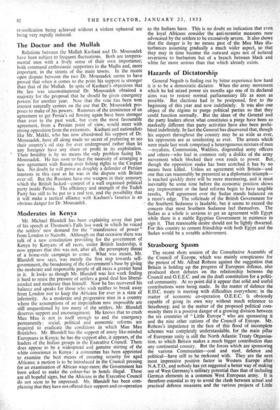Moderates in Kenya
Mr. Michael Blundell has been explaining away that part of his speech at Thomson's Falls last week in which he voiced the settlers' new demand for the "transference of power" from London to Nairobi. Although on that occasion there was talk of a new constitution providing for the government of Kenya by Kenyans of all races, under British leadership, it now appears that this was not, after all, the peremptory threat of a home-rule campaign to come. What was meant, Mr. Blundell now says, was merely the first step towards self- government, the broadening of the Government's base by giving the moderate and responsible people of all races a greater hand in it. It looks as though Mr. Blundell was last week finding it hard to resist the pressure of settlers a good deal less liberal- minded and moderate than himself. Now he has recovered his balance and speaks for those who wish neither to break away from London nor to keep the Africans for ever in a state of inferiority. As a moderate and progressive man in a country where the assumptions of an imperialism now impossible are still unquestioned by too many of the settlers, Mr. Blundell deserves support and encouragement. He knows that to crush Mau Mau is not in itself enough to end the emergency permanently: social, political and economic reforms are required to eradicate the conditions in which Mau Mau flourishes. Mr. Blundell has the support of many like-minded Europeans in Kenya; he has the support also, it appears, of the leaders of the Indian groups in the Executive Council. There does appear to be a widespread and genuine stirring of the white conscience in Kenya : a committee has been appointed to examine the best means of ensuring security for aged Africans; a motion is to be introduced in the Council pressing for an examination of African wage-rates; the Government has been asked to make the colour-bar in hotels illegal. These are all hopeful signs, but the Africans in the Executive Council do not seem to be impressed. Mr. Bhmdell has been com- plaining that they have not offered their support and co-operation as the Indians have. This is no doubt an indication that even the loyal Africans consider the nti-terrorist measures now advocated by the settlers to be excessively severe. It also shows that the danger is by no means past of the Mau Mau dis- turbances assuming gradually a much wider aspect, so that they may in time become the outward signs not of isolated reversions to barbarism but of a breach between black and white far more serious than that which already exists.


































 Previous page
Previous page